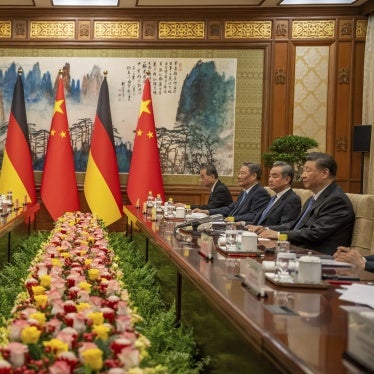(New York) – The Vietnamese government should drop politically motivated charges against Le Quoc Quan, one of Vietnam’s most prominent and respected human rights defenders, Human Rights Watch said today. Vietnam’s donors should communicate serious concerns about Hanoi’s ongoing crackdown on rights defenders and bloggers, and publicly call for the unconditional release of Le Quoc Quan and other peaceful critics.
Le Quoc Quan’s trial was originally scheduled for July 9, 2013, but it was postponed at the last minute and has been rescheduled for October 2, at the People’s Court of Hanoi. Tax evasion carries a maximum of seven years’ imprisonment and a significant fine.
“Le Quoc Quan’s apparent crime is to be an effective public critic of the Vietnamese government,” said Brad Adams, Asia director at Human Rights Watch. “When will the Vietnamese government accept that freedom of expression includes the freedom to peacefully express opinions that differ from those of the ruling party?”
The Vietnamese government has previously used tax evasion charges to imprison prominent blogger Nguyen Van Hai (Dieu Cay) in 2008. At his trial he wassentenced to prison for 30 months. On the day Dieu Cay was supposed to be released, he was held on a new charge, “conducting propaganda,” and then sentenced to an additional 12 years in prison.
Le Quoc Quan, 41, is a lawyer and blogger, and a leading voice advocating human rights and democracy. He was arrested on December 27, 2012, nine days after the British Broadcasting Corporation published his article entitled, “Constitution or a contract for electricity and water service?” The article commented on discussions about amending Vietnam’s constitution. Le Quoc Quan’s piece criticized the retention of article 4 of the constitution, which makes the Communist Party preeminent in national life.
Before his current detention, Le Quoc Quan wrote prolifically on his popular blog about human rights, civil rights, political pluralism, religious freedom, and other issues. His website documented human rights violations against him, his family, and fellow activists. He was also involved in a series of peaceful protests in Hanoi over claims by China to sovereignty over parts of the South China Sea, which Vietnam says are within its maritime territory.
In 2006-2007, Le Quoc Quan spent five and a half months in Washington, D.C., as a fellow of the National Endowment for Democracy, which is funded by the US Congress. He used the prestigious fellowship to do research on civil society in connection with his interest in economic development that would benefit the nation’s poor. He was arrested in March 2007, days after returning to Vietnam following completion of his fellowship, for alleged subversion under the vague provisions of article 79 of Vietnam’s penal code. Following domestic and international criticism, the authorities released him in June 2007. He lived under constant police surveillance until his arrest in December 2012.
Le Quoc Quan attempted to run for a seat in the Vietnam National Assembly in 2011 but was blocked by the authorities. That year he was temporarily detained for “causing public disorder” when he attempted to observe the trial of the prominent dissident Cu Huy Ha Vu. On August 19, 2012, he was assaulted by two men, one of whom he recognized as a person who had been following him for months, and had to be treated in a hospital for his injuries. The police do not appear to have seriously investigated this crime.
“The Vietnamese government appears to be so nervous about its position in society that it is reflexively finding ways to silence and imprison dissident after dissident,” Adams said. “Hanoi should realize that government critics reflect a large and growing body of opinion in the country that it is time for Vietnam to become a genuine multi-party democracy in which free speech is tolerated. These voices will not be silenced by such heavy-handed tactics.”






